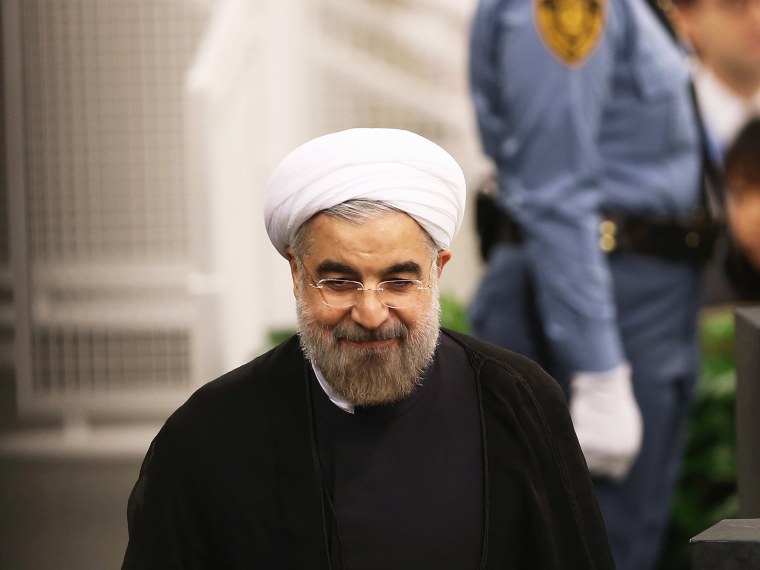Newly-elected Iranian President Hassan Rouhani is insisting his decision to not meet with President Obama at the United Nations on Tuesday wasn’t personal.
“We have no problem shaking Mr. Obama’s hand or negotiating, but we need a plan of action to ensure these meetings create the conclusions that we want,” he told a group of American media representatives, including NBC News on Wednesday. “We did not have enough time to make it happen.”
Despite the recent warming of relations and speculation that the two leaders could meet face-to-face, two senior U.S. administration officials said Wednesday that the Iranians were not ready to have such a meeting and that the encounter proved “too complicated” for Iran back home. They added Obama had been open to an informal meeting.
Rouhani skipped the U.N. luncheon where many had speculated the two might shake hands.
It would have been the first direct interaction between a U.S. president and an Iranian leader since the 1979 revolution in Iran. Secretary of State John Kerry is still scheduled to meet with Iranian foreign minister Mohammed Javad Zarif on Thursday for preliminary talks in what both sides have signaled they hope will become full negotiations over Iran’s nuclear program and international sanctions.
Rouhani said it was two days ago that the U.S. proposed the meeting. “This is a very sensitive subject,” Rouhani said. “We have not talked at that level for 35 years. We must take these steps carefully."
White House Press Secretary Jay Carney said on Wednesday that the president is not disappointed that Rouhani turned down the offer to meet.
Obama "was open to the possibility of an informal encounter with President Rouhani and remains open to that, as he has, broadly speaking, since he took office," said Carney.
The Iranian leader has been trying to distinguish himself from his vitriolic predecessor Mahmoud Ahmadinejad, who created a whirlwind of drama at previous U.N. gatherings. In 2009, several nations walked out after he questioned whether the Holocaust ever happened.
In his remarks to reporters, Rouhani disavowed Ahmadinejad’s remarks. He had previously told NBC News’ Ann Curry that he couldn’t comment on Ahmadinejad’s comments about the Holocaust because he was not a historian.
“The massacre by the Nazis was condemnable. We never want to sit by side with the Nazis,” he said. “They committed a crime against Jews, which is a crime against Christians, against Muslims, against all of humanity.” He added that the scale and the numbers of the atrocity should be left to historians but “Nazis carried out a massacre that cannot be denied, especially against the Jewish people.”
During his speech to the United Nations General assembly on Tuesday, Rouhani said he was confident his country and the U.S. can “arrive at a framework to manage our differences.” On his nuclear program, he said his country was prepared to engage in “time bound and result oriented discussions.”
But the speech was not without its criticisms. Rouhani condemned what he said was the “persistence of a Cold War mentality” and the “bipolar division of the world into a superior us and an inferior others.” He also denounced the use of drone strikes in the Middle East and called the U.N. sanctions against his country “violent—pure and simple,” adding they “cause belligerence, war-mongering and human suffering.”
